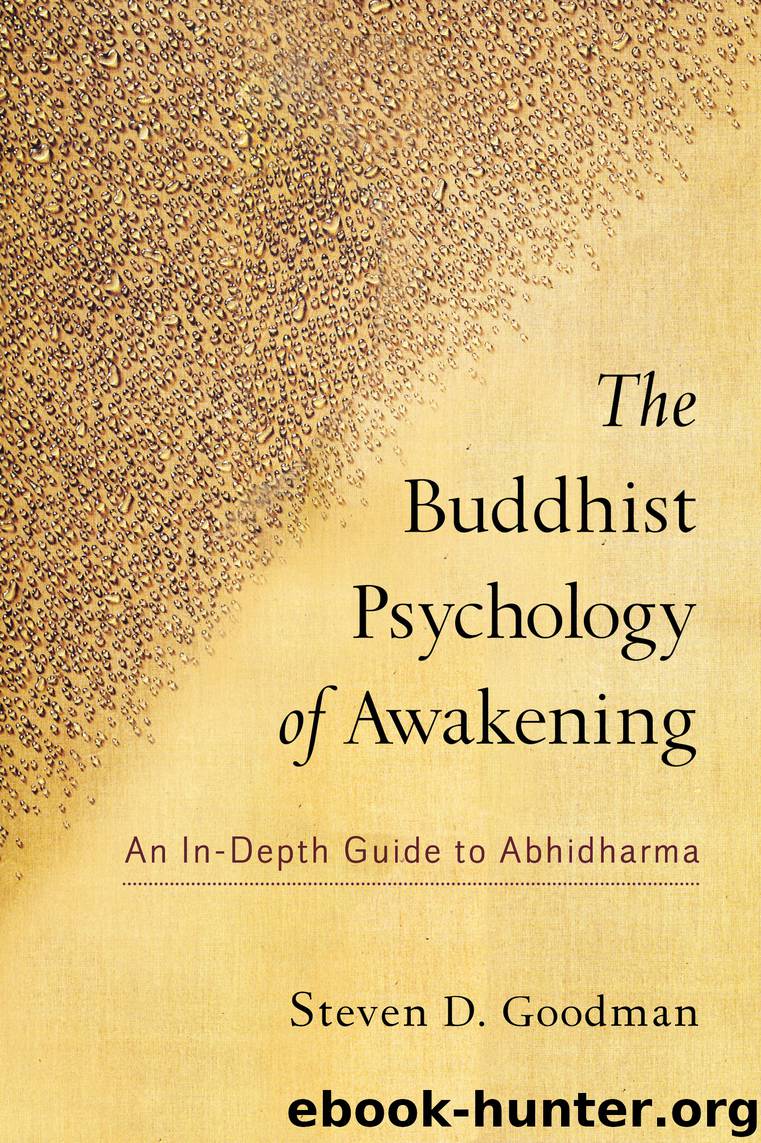The Buddhist Psychology of Awakening by Steven Goodman

Author:Steven Goodman [Goodman, Steven]
Language: eng
Format: epub
Publisher: Shambhala
Published: 2020-05-19T00:00:00+00:00
Karmic Doors
All behavior is analyzed in the Abhidharma tradition according to the three karmic doors of body, voice, and mind, and they are the expression of a single though powerful dharma, which is called “willing” or “intending” (chetana), and also what arises in the wake of that willing, what was willed, the manifest expression of that willing (cetayitva). This is a way of talking about karmic behavior, distinguished from unintended responses, those which do not involve intention. Examples of such unintended responses are vocal startle responses and bodily reflex responses. For example, if I am speaking to you, this is called the energy of being vocally intended, and it is said it occurs through the door of the voice. When I move, this is the energy karma via the body.
According to the Abhidharma prior to every speech act, and every intended physical response of ours, there is always present the energy of an intent. To be clear, this technical word—chetana in Sanskrit—has received quite varied translations. It does not mean I consciously intended something, and then I decided to express it. Rather it names the force or arc of a prior movement of mind, one that entails the expression (the karmic flow) of speech acts or physical responses. It is classed as one basic factor of experience, one dharma. Vasubandhu dedicates the entire fourth chapter of his Treasury of Higher Dharma (Abhidharmakosha), which he calls “an investigation into karma” (karma nirdesha), to how this one dharma works, both its form as an intending, working through the door of the mind (chitta), and also what gets expressed, intended, through the doors of speech and body.
To reiterate, it’s said that there is something invisible that always occurs before we express karma. And that which is unseen or unmanifested is on the mind side. It is unmanifest and then it tends toward manifestation through the vocal and physical karmic doors. Every vocal or physical act leaves a karmic trace. That trace goes into a karmic reserve and may serve as the source for another karmic activation later. Every caress and slap leaves an impression. For example, let’s say there is a new dog around, and when you reach out to caress it, it steps back. Perhaps that dog reacts this way because it has experienced something other than a caress many times before. It is not about to be hurt, but there is the karmic trace which was left from many past occasions of being hurt. It remembers and it brings this into the present time as a way of responding. And we are like that dog. We remember. That, more or less, is a full picture of what we might call karmic behavior according to the Abhidharmakosha.
In terms of our experiential model of dhatu analysis, it is enough to know that talking is a moment of channel 5, and listening is a moment of channel 2, and so on. Those six channels account for everything that has occurred in the past, is occurring now, and will occur in the future.
Download
This site does not store any files on its server. We only index and link to content provided by other sites. Please contact the content providers to delete copyright contents if any and email us, we'll remove relevant links or contents immediately.
| Confucianism | Feng Shui |
| I Ching | Jainism |
| Karma | Shintoism |
| Sikhism | Tao Te Ching |
| Taoism | Tibetan Book of the Dead |
| Zoroastrianism |
The Tao of Physics by Fritjof Capra(1848)
The Diamond Cutter by Geshe Michael Roach(1671)
Feng Shui by Stephen Skinner(1616)
Human Design by Chetan Parkyn(1574)
The Alchemy of Sexual Energy by Mantak Chia(1490)
Tao Te Ching by Lao Tzu(1485)
365 Tao: Daily Meditations by Ming-Dao Deng(1301)
Tao Tantric Arts for Women by Minke de Vos(1260)
Sun Tzu's The Art of War by Giles Lionel Minford John Tzu Sun(1246)
Karma-Yoga and Bhakti-Yoga by Swami Vivekananda(1221)
Sidney Sheldon (1982) Master Of The Game by Sidney Sheldon(1187)
Buddhism 101 by Arnie Kozak(1185)
The Analects of Confucius by Burton Watson(1145)
The Art of War Other Classics of Eastern Philosophy by Sun Tzu Lao-Tzu Confucius Mencius(1140)
The New Bohemians Handbook by Justina Blakeney(1104)
Tao te ching by Lao Tzu(1077)
The Way of Chuang Tzu by Thomas Merton(1070)
The Sayings Of by Confucius(1027)
Bless This House by Donna Henes(990)
